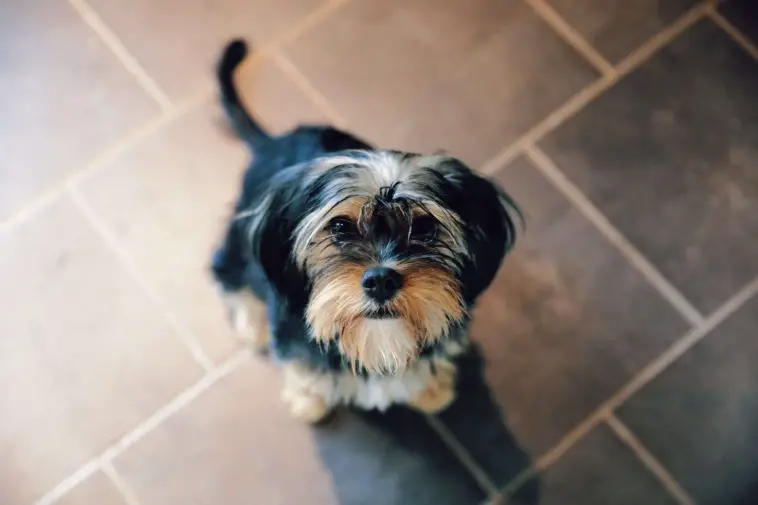Yorkies, unlike other dogs, have hair instead of fur and it is unlikely for them to shed a lot. If your Yorkie has recently started to shed hair, you’re probably wondering, “Why Is My Yorkie Shedding?”
Why Is My Yorkie Shedding?
It is common for Yorkies to shed hair when they are going through their heat cycle or if they are pregnant. Their silky coat will generally grow back after the gestation period. Sometimes seasonal or environmental allergies may also cause your Yorkie’s hair to shed.
Why Is My Yorkie Shedding? Top 11 Reasons
1. Hormonal changes due to pregnancy
If you have a female dog who is pregnant, it is natural for her to lose her hair. Hormones control hair growth in dogs and female dogs undergo great hormonal changes during their pregnancy.
As per the Vetwest hospitals, one of the other reasons is that if your Yorkie is lactating, it leads to a depletion of calcium and other essential minerals that your Yorkie needs to keep its hair lustrous.
However, you can expect the shedding to stop in your dear pet once the pregnancy and the lactation and nursing phase are over.
2. Skin Related Allergies
Skin allergies (dermatitis) are common in Yorkshire Terriers. Your Yorkie may develop skin infections as a result of these allergies. Frequently, this results in some hair loss in the dog.
If your Yorkie has unnatural shedding as a result of allergies, it will usually happen all of a sudden. They could even be losing patches of hair rather than strands of hair.
According to Dr. Tammy Hunter, DVM, dermatitis can be caused by a variety of factors, but the most common appears to be environmental or external factors.
Allergy testing is highly recommended to determine what your Yorkie is actually allergic to. You’ll be more likely to eliminate the root cause in the future this way.
3. Common allergies
One of the key reasons to answer your question on Why is my Yorkie shedding is the allergies. Yorkies are a tough little breed, but beneath their tough exterior, some Yorkies may have serious allergies.
Atopic dermatitis is caused by allergic reactions to common substances such as mold, yeast, dust, certain bacteria, and pollen. This condition is characterized by frequent biting, licking, and gnawing of the inflamed skin, which results in patchy hair loss.
Allergen sensitivity can be tested by your veterinarian. A topical skin test or a blood test is usually used in the procedure. They may perform a blood test or a fecal exam if your dog’s allergies are diet-related, as is the case with Dog IBD and IBS.
The dry, irritated Yorkie skin should always be addressed when treating an allergy-prone Yorkie. The quicker inflamed skin heals, the faster Yorkie hair loss can be reversed and a puppy’s coat can be restored to its former glory.
4. Your Yorkie is molting
Yorkies, unlike other dogs, don’t have fur but have hair instead. Hence, the molting continues around the year, quite similar to human hair. However, you may not be able to see this shedding, as the hair tends to fall back again to the Yorkie’s coat.
You may notice the shedding while you are taking your Yorkie for a bath, or brushing his hair.
Also Read: When do Yorkies change color?
5. Vitamin deficiencies
To keep your dog healthy, feed him a well-balanced, high-quality diet. It’s possible that he’s lacking in vitamins B and E, which would explain his hair loss.
There are dietary supplements available, but you can also add a teaspoon of brewer’s yeast to your dog’s food every day. In any case, it’s best to consult with your veterinarian for unusual hair loss.
6. Color Dilution Alopecia (CDA)
Dr. Robin Downing, DVM states that CDA, or color dilution alopecia, is a genetic condition that causes hair loss in patches in dogs.
In this condition, the Yorkies’ hair follicles are abnormal, and thus, the follicles fail to properly generate new hair. The hair follicles may time are self-destructing in nature, which can lead to hair fall or hair thinning in Yorkies.
Itchy skin and bluish pigmentation of the lips, eyelids, and noses are common symptoms of the condition.
8. Cushing syndrome
Cushing’s syndrome is a disease that affects older dogs and can be dangerous. Excess cortisone, a steroid secreted by the adrenal gland, causes Cushing’s disease. Overproduction of the steroid may occur naturally or as a result of steroid injections.
Dogs who require steroids on a regular basis throughout their lives are at a higher risk of developing this condition. Cushing’s disease causes a pot-bellied appearance and an increase in water consumption, in addition to hair loss. If your Yorkie exhibits these signs, make an appointment with your veterinarian for testing.
9. Hypothyroidism
Hyperthyroidism can cause severe hair fall in Yorkies. It can also cause hair thinning, lack of luster in the hair, and excessive hair shedding. While this reaction is throughout the body, you can see that the shedding is comparatively less in the head and legs region.
As per the American Kennel Club, other symptoms of hypothyroidism in Yorkies include:
- Weight loss or weight gain
- Increased metabolic activity
- Skin thickening
- Lethargy
10. Parasites & other bacterial infections
Pyoderma is a bacterial infection of the skin that causes dog hair to shed. This infection causes itchy patches of skin and temporary hair loss, as well as red, pimple-like rashes. Pyoderma is usually diagnosed through a visual examination at the veterinarian’s office, but more conclusive skin scrapings or blood tests may be required.
Ringworm is another common skin infection that can cause hair loss in dogs. Yorkshire Terriers are especially vulnerable to this fungal infection, which is spread through contact with contaminated objects or infected animals.
Hair loss in a circular pattern around the infection site, accompanied by scaly inflammation of the skin, is one of the most common ringworm symptoms. To help prevent the spread of the infection, topical cream or spray is usually used, along with a medicated shampoo.
11. Poor state of mind
Boredom or stress can cause hair loss in some dogs. When Yorkies are stressed or anxious, they may chew, lick, or bite on different parts of their bodies which causes their hair to shed in patches.
Chronic licking and biting can eventually result in neurogenic dermatitis, skin irritation, and inflammation around the target area. Inflammation usually causes discomfort, which leads to a cycle of more licking and biting, which often results in hair loss and severe irritation.
Many factors contribute to neurogenic dermatitis but ensuring that a dog feels safe, connected to his humans, and mentally stimulated can help reduce or eliminate many of the underlying psychological factors.
9 Ways To Stop Excessive Shedding in Yorkies
If you are bothered by the question: Why is my Yorkie shedding , then check out these 9 ways to prevent shedding in your four legged friend.
1. Good grooming habits
Brushing, bathing, and the occasional trimming are the only three things you need to do for maintaining a healthy coat. It’s critical that you give your Yorkie a bath on a regular basis. You don’t want to give them baths all of the time, though. Allow me to explain.
Too many baths, according to PetMD, will strip the dog’s coat of its essential and natural oils. These oils are designed to keep your dog’s skin healthy. Furthermore, these oils keep the Yorkie’s coat glossy and shiny.
The Yorkie’s single coat means they don’t require as many baths as dogs with double coats. Bathing is a good way to control shedding in double coats because they shed so much. Make sure you do your research before buying shampoo for your dog.
Read Also: Best Shampoo For Yorkie
2. Natural food supplements
Natural food supplements, such as salmon oil and brewer’s yeast, are effective when mixed directly into the ration to keep your Yorkie’s hair healthy. They’re also available in chewable tablet form, as well as vitamin and omega 3 and 6 veterinary supplements. Hypoallergenic grain-free kibbles are frequently recommended for dogs who are prone to skin diseases.
Read Also: Best Dog Food For Yorkie
Zinc is an enabler, assisting the Yorkie’s body in performing a variety of functions efficiently. Fortunately, including zinc in your dog’s diet is simple. Zinc is abundant in non-processed meats such as beef, chicken, and halibut. Eggs can also be a delectable cure.
3. Use a good comb
Yorkies’ skin is less protected and more sensitive when brushing because their coats are so thin. When brushing your puppy, pay special attention to the type of brush you use and the amount of pressure you apply.
You’ll need a pin brush and a bristle brush at the very least. You’ll also want to keep a stainless steel comb on hand in case of particularly bad tangles or matting.
If your Yorkie is prone to large mats, you should invest in a slicker brush and increase your grooming frequency to three to four times per week. This will keep the natural oils in your Yokie’s coat evenly distributed throughout the hair, preventing nasty snarls from forming.
Finally, your heavy artillery option should be a dematting comb (sometimes called an undercoat rake). When mats are so bad that you need to cut your way through them, this bad boy comes out as a last resort.
4. Try apple cider vinegar
Apple cider vinegar has a high acidity level. That may not sound like a soothing solution for a dog’s health problems, but the skin is naturally acidic, and apple cider vinegar helps to restore the skin’s pH balance.
When a dog’s skin is afflicted with bites, welts, or inflammation, apple cider vinegar acts as an anti-inflammatory. Fleas are naturally repelled by apple cider vinegar. It also helps to alleviate allergy symptoms. Try giving your Yorkie an apple cider vinegar bath.
5. Eliminate allergens from the air
The key to preventing Yorkie scratching and hair loss is to keep the skin healthy. Yorkies with chronic allergies scratch excessively and groom themselves harshly, causing permanent damage to their skin and coat.
Finding the source of your Yorkie’s itchy skin, limiting your pup’s exposure to allergens, and keeping their environment clean will all help to reduce scratching. Your dog will be much happier and more at ease.
6. Use topical olive oil
Monounsaturated fats, antioxidants, and omega-6, and omega-3 fatty acids are good sources of healthy nutrients for your dog’s coat. They can be found in abundance in extra virgin olive oil.
Olive oil is high in fatty acids, which give your dog’s coat a beautiful shine. Do not apply olive oil externally to your dog’s hair because it works internally at the cellular level. Because it’s tasty, there’s a good chance they’ll lick the area where it’s applied, potentially causing skin irritation and hair loss. Keep in mind that adding olive oil to your dog’s diet could take up to 30 days to see results.
7. Go organic!
It’s also crucial to use natural and healthy products on your dog’s skin. According to research, keeping your dog’s skin pH levels stable and the skin biome healthy leads to long-term disease and skin condition resistance. Many of these illnesses can severely harm a Yorkie’s skin, resulting in an unhealthy coat and an unhappy dog.
8. Try lemon juice
For anyone with the question, why is my yorkie shedding, lemon juice is a simple solution.
Lemon juice is a natural antibacterial agent, similar to apple cider vinegar. Basically, you use it the same way you would apple cider vinegar on your dog’s hair loss problem – as a spot treatment directly on the affected areas or as a rinse.
Make an infusion by combining a slice of lemon with four cups of warm water and allowing it to steep for five hours. Remember to strain the lemon pulp before using it, or you’ll have a hard time brushing it out of Charlie’s coat.
9. Coconut Oil
Coconut oil has proven to be an effective skin conditioner and replenisher for many pet parents. It is also naturally anti-microbial and anti-inflammatory, so it’s a win-win situation.
Place a quarter teaspoon of solidified, raw coconut oil in your palm and warm it for about thirty seconds with your body temperature. Then gently massage the softened oil into your dog’s coat and into the skin.





